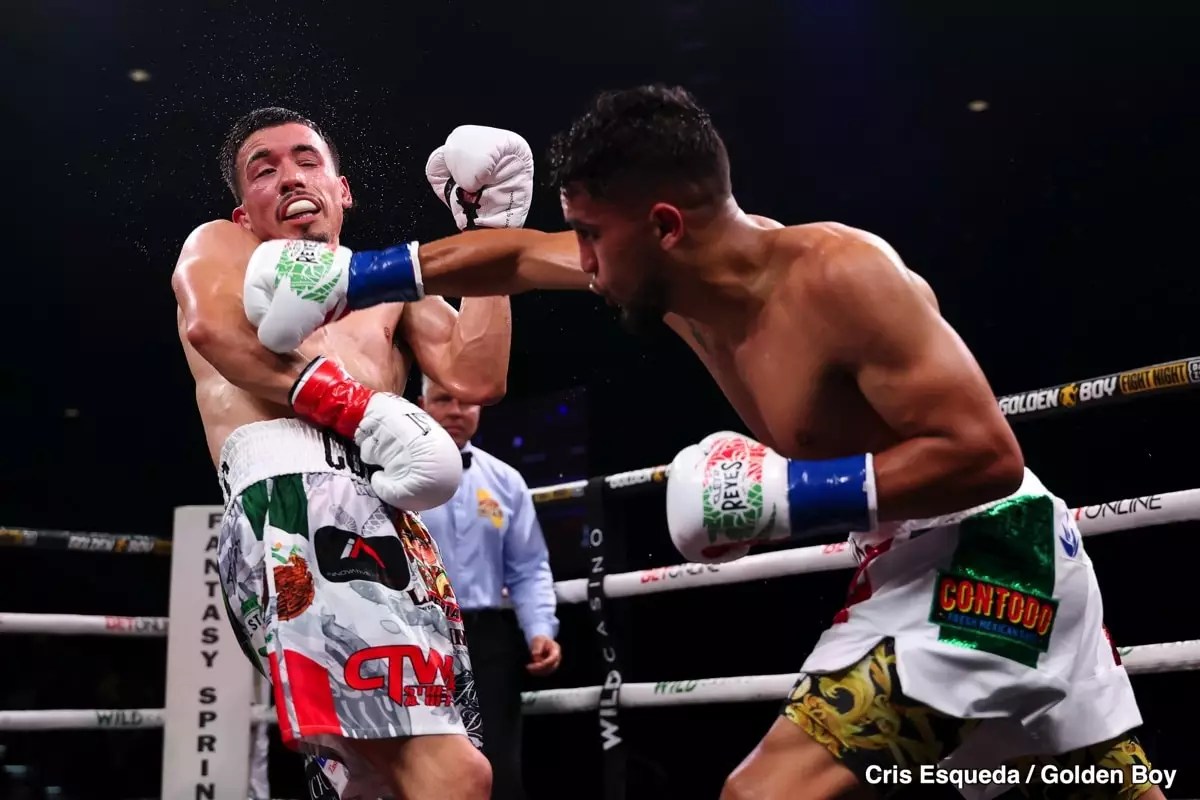Boxing, often called the sweet science, is inherently rooted in spectacle, skill, and the unwavering pursuit of victory. Yet, the recent clash at Fantasy Springs exposed a glaring flaw within the sport: the subjectivity of judging decisions. When Manuel “Gucci Manny” Flores and Jorge Chavez finished a grueling ten-round battle with a draw, the crowd’s energy shifted from excitement to outrage. Judging in boxing should ideally be an impartial measure of who lands more effectively, who displays better ring craft, and who demonstrates resilience—a true reflection of the fighters’ efforts. Instead, what transpired was a stark reminder that human judgment, no matter how experienced, remains fallible, susceptible to bias, misinterpretation, or even plain indifference.
The judges’ scorecards, with readings like 93-97, 95-95, and 95-95, seemed inconsistent with the on-ring action. Chavez, visibly agitated, vocally questioned the decision, pointing to a cut that he claimed resulted from a headbutt rather than a punch and dismissing Flores’s punch power as superficial. His frustration was palpable; he expected a clear-cut victory and felt the judges’ scorecards betrayed the fight’s reality. His bravado, declaring he’d “touch him next time” and calling out potential future matchups like Picasso, reflected a fighter fueled by disappointment but also defiance—an athlete’s reaction to perceived injustice.
Yet, this controversy underscores a deeper problem that plagues boxing: what happens when the scales of fairness tip unevenly, and fans, fighters, and promoters are left questioning whether the sport’s integrity is intact? Boxing’s allure hinges on its perceived fairness. When decisions routinely swing in questionable directions, the credibility of the entire sport suffers. Referees and judges are entrusted with fairness, but in reality, their subjectivity can turn fights into political or subjective battles, diluting the essence of sport—a competition between equal rivals.
Judicial Ambiguity and Its Impact on Fighter Confidence
This event also highlights the consequences of inconsistent officiating on fighters’ psyche. Chavez’s comments about Flores’s supposed lack of power question a fundamental aspect of boxing: the evaluation of punch effectiveness. If judges are swayed by fighters’ reputations, their perceived aggressiveness, or simply by subjective impressions, then fighters are left navigating a murky moral landscape. Fighters like Flores, who prefer to box cautiously, worry about the judges’ biases, fearing that their efforts may be undervalued simply because they didn’t engage in a perceived “brawl.”
Furthermore, the fighters’ reaction reveals their own uncertainties and strategic adjustments. Chavez’s vow to “start swinging earlier” next time implies a recognition of the fight’s dynamics but also exposes the unpredictability of judging. Should fighters change their style out of fear of unfair scoring? The entire fabric of traditional boxing strategy becomes threatened when an athlete’s approach is dictated not only by in-ring tactics but also by external, subjective evaluations.
Judging inconsistencies contribute to a climate of mistrust in the sport, discouraging young fighters from channeling their authentic styles and instead pushing them toward more aggressive, less nuanced tactics to secure victory in the eyes of officials. The mental toll is significant, often leaving fighters questioning their worth and risking unnecessary damage for the sake of superficial fairness.
The Underwhelming Co-Main and the Need for Accountability
While the main event exemplified controversy, the undercard showcased the stark contrast that good officiating and clear results can bring to the sport. For instance, Jordan Ngoga’s calculated approach earned him a majority decision over the overhyped Panthen—a result that was uncontroversial and was accepted without the social media firestorm that often accompanies murky decisions. Similarly, fighters like Cayden Griffiths and Leonardo “Bazooka” Sanchez demonstrated the importance of decisiveness, each securing stoppages that reinforced the fighters’ dominance and clarity of outcome.
Conversely, the shockingly uninspired draw between Bryan Lua and Kevin Piedrahita exemplified what happens when officiating and judging lack transparency. Multiple judges’ scores ranged from 76-76 to 78-74, yet most felt it was a fight with little flair or genuine competitor parity. Such outcomes diminish public confidence and suggest that some undercards might benefit from better scoring standards and more rigorous oversight.
One of the key lessons here lies in accountability. Referees and judges should be held to higher standards, and their decisions should be open to review and scrutiny. Boxing’s governing bodies must embrace transparency, provide consistent training for officials, and possibly integrate more technology or real-time scoring systems to reduce human error and bias. Only through such reforms can the sport hope to reclaim its reputation for fairness and professionalism.
The Road Ahead: Restoring Faith in Boxing’s Integrity
The aftermath of this fight segment reveals a pressing need for reform within the sport’s judging system. As fans, fighters, and promoters become more vocal about perceived injustices, the sport must listen and adapt. This could mean refining judging criteria, employing digital oversight, or simply demanding higher accountability from officials. The goal should be clarity, fairness, and a reinstatement of trust—a cornerstone upon which boxing has thrived in the past but currently risks losing.
Ultimately, boxing’s destiny hinges upon its ability to maintain the delicate balance between athletic drama and justice. When fighters like Chavez and Flores trade blows, they do so as representatives of a centuries-old tradition. It is the sport’s responsibility to ensure that these traditions are preserved through fair evaluation and unambiguous results. Only then can boxing truly claim to be the king of sports that values skill, resilience, and integrity above all else.

